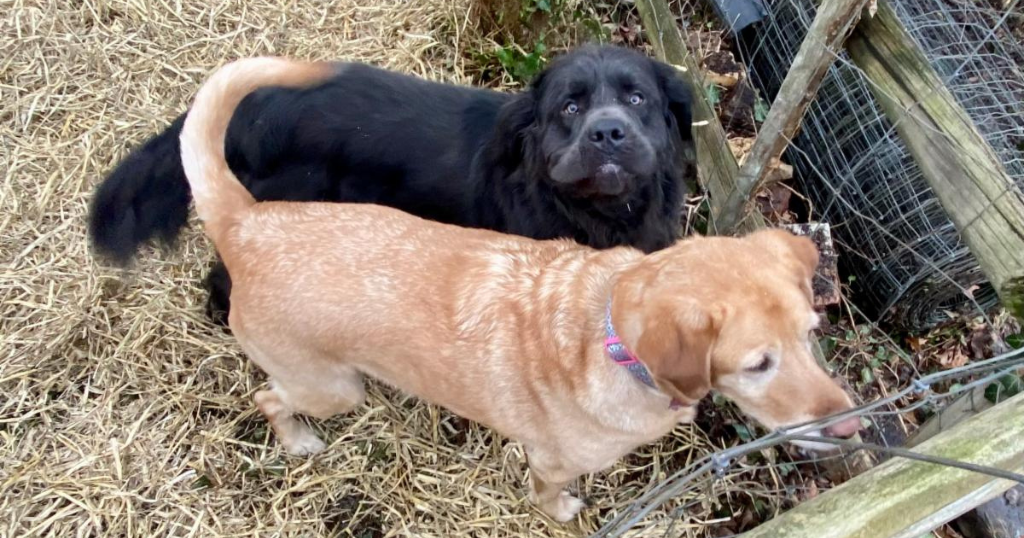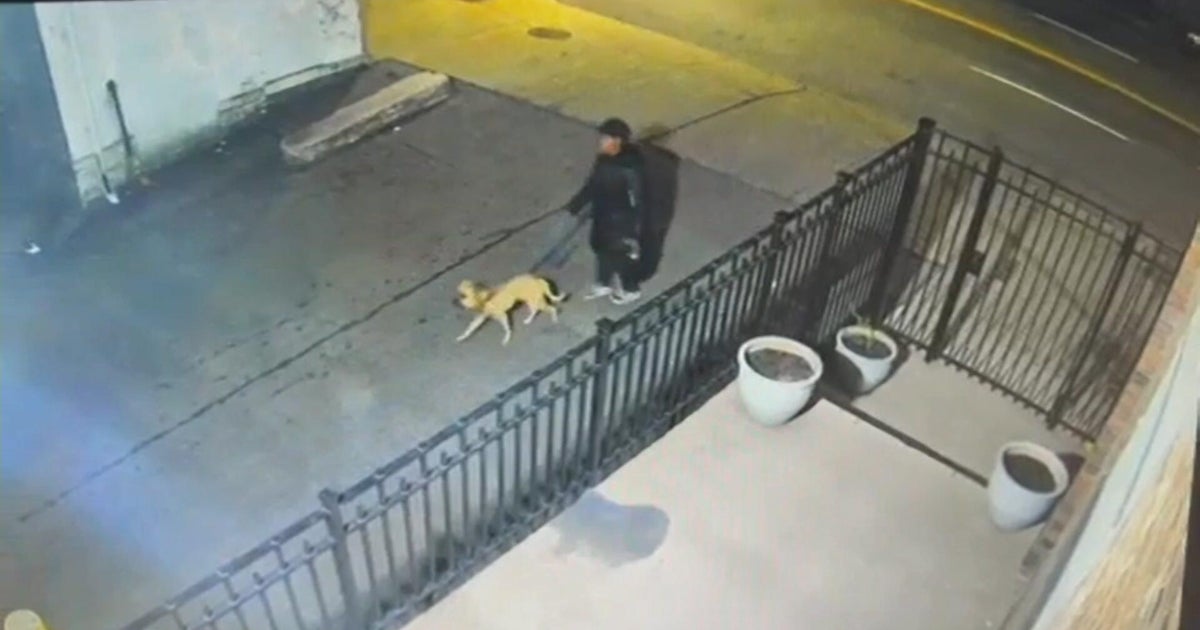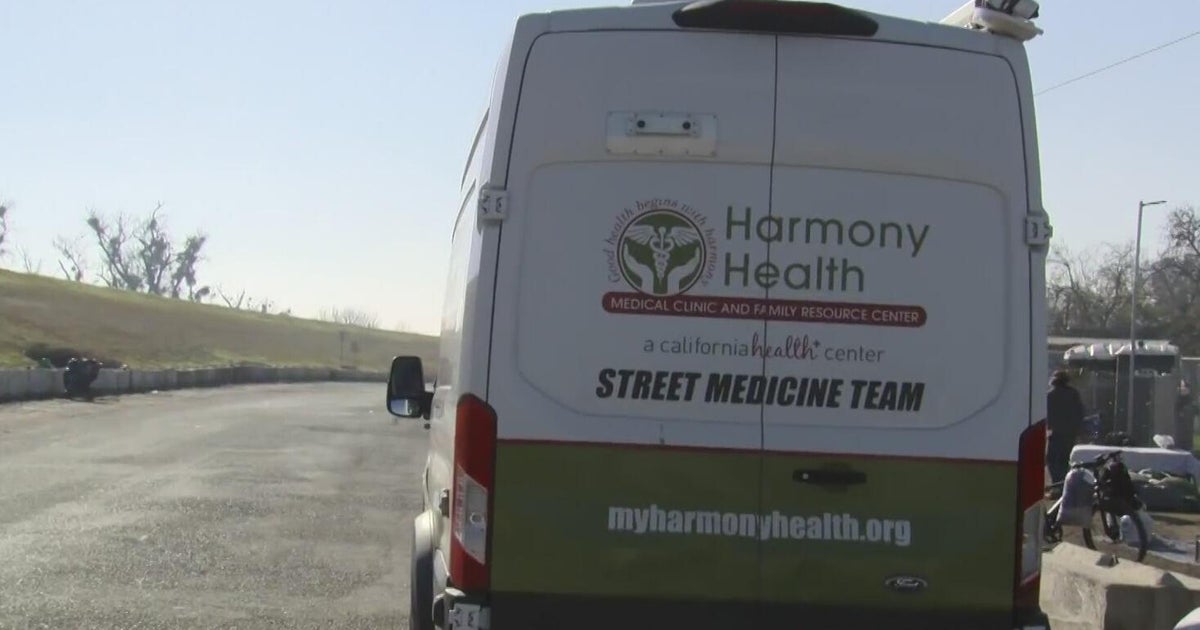I-Team Investigates: Where Are Puppy Stores Getting Their Dogs From?
By Charlotte Huffman
PHILADELPHIA (CBS) -- "My question is simple - are you getting all of your dogs from licensed breeders?" Investigative Reporter Charlotte Huffman asked Patrick Youmans as he closed the door to his Cherry Hill store without answering.
It's a question that protestors want answered too.
The protestors have stood outside Youmans' store, Pat's Puppies almost every day, rain or shine since the store's June opening.
The group of animal rights supporters and former Pat's Puppies customers can be seen along Route 70 holding signs that say "A Pet Store Puppy Is A Puppy Mill Puppy" and "Adopt. Don't Shop."
They allege Pat's Puppies and other pet stores are selling cheap and often sick dogs from unlicensed breeders or puppy mills to unsuspecting customers like Jamie Landsman.
Landsman's Story
Landsman bought a dog from Youmans' store in Waretown, N.J. last year. She says she immediately realized the dog was sick and returned it and bought Alice, a Rottweiler puppy instead.
She paid $800 and says she asked all the right questions.
"I wanted to make sure it wasn't from a puppy mill and they said 'no these are legitimate breeders.'"
In the agreement of sale given to Landsman at the time of purchase, the store guaranteed her that Alice was in "good health" and "without any sign of contagious or infectious diseases" or "sign of defect which is congenital."
But Landsman says that was not the case.
"When I brought her home she had so many different issues."
Days later, Landsman took Alice to a veterinarian and a cardiologist where the puppy was deemed "unfit for sale" because she had intestinal parasites, tapeworms and worst of all – a severe stage of a congenital heart disease.
"I was devastated. I was so angry," Landsman recalls.
Alice was diagnosed with subvalvular aortic stenosis (SAS), the most common heart disease found in Rottweilers.
Landsman was warned that Alice would most likely live less than three years and sudden death can occur.
Landsman says she realized Alice would probably be euthanized if she returned her to the store "because Alice was no longer of any monetary value." So she decided to give the puppy a chance at life -- even if it meant a short life filled with prescriptions and routine trips to the cardiologist at almost $500 dollars per visit. Landsman has created a GoFundMe account to help support Alice's medical needs.
"I knew it was going to be a big sacrifice and I wasn't even thinking about the money at that point," said Landsman who has delayed her wedding ceremony in order to care for Alice who may be a candidate for a surgery that would cost $7,000 to $10,000 dollars.
"I want to do whatever I can to keep other people from also going through this," said Landsman who has been trying to track down Alice's breeder because she fears the breeder is continuing to breed dogs with SAS, a defect that is easily passed on to offspring.
She says Pat's Pups won't tell her exactly where Alice came from but the dog's paperwork says she came from "King, Lititz, PA."
USDA officials tell the I-Team they do not have a licensed breeder by that name in Lititz.
Selling dogs from unlicensed breeders was not illegal back then in New Jersey – but it is now.
The Pet Purchase Protection Act
"We hear so many horror stories about people purchasing animals. They have absolutely no background on the animal, where it was bred or the breeder," said Senator James Holzapfel.
The state senator from New Jersey sponsored the "Pet Purchase Protection Act" which aims to give consumers the information they need so that they can do their homework.
The law says stores can only sell dogs that are obtained directly or indirectly from licensed breeders and requires stores put a dog's background information on so-called "cage cards" on the exterior of each cage. Required cage card information includes but is not limited to; the breeder's name, address, phone number and the breeder's USDA and state license number.
Click here to read the law's full text.
The I-Team Goes Undercover Inside Pat's Puppies
When the I-Team went undercover inside Pat's Puppies we found minimal information was displayed on the cage cards. USDA and state license numbers were nowhere to be found.
"That's a waste of paper," Sen. Holzapfel said when we showed him photos of the store's cage cards.
The I-Team Returns to Pat's Puppies for Answers
"You guys aren't allowed in here with the camera," said Youmans' fiancé.
"Well we just have a couple of very simple questions. Can we step outside and talk?" reporter Charlotte Huffman asked...
"C'mon. No," said Youmans as he motioned Huffman and her photographer out the door.
"It's a yes or no question – are you getting your dogs from licensed breeders? Can't you just answer?" Huffman said as Youmans closed the store's front door.
Multiple requests for comment from Youmans have not yet been answered.
Following Gus' Puppy Trail…
When the I-Team went undercover inside Youmans' store, he told us that he only gets his puppies from licensed breeders. But we discovered that's not the case with this puppy named "Gus."
Rose Edwards paid Youmans $900 dollars for Gus in July and says "as a consumer I'm going to trust (Youmans) that (Gus) is from a licensed breeder."
Gus's paperwork might make you think he came from Quail Creek Kennel, LLC - a USDA licensed company.
But Quail Creek Kennel is just the broker, serving as the middle-man between the breeder and the store.
Many pet stores use brokers to help hide the source of the breeders they are using and stay within the law, says protest organizer and animal rights supporter, Alan Braslow.
"A broker is nothing more than a consolidator who goes around to different mills or breeders and they buy up the dogs and ship them here in mass," he said.
So Where Did Gus Really Come From?
According to Gus' acquisition papers obtained by the I-Team, Gus came from a breeder in the Amish countryside of Ohio in an area that animal rights groups call "ground zero for puppy mill breeding," where there are an estimated 540 puppy mills in one county alone.
The I-Team confirmed with USDA and Ohio Department of Agriculture officials that Gus was bred by an unlicensed breeder.
Gus' papers show the unlicensed breeder sold Gus to the broker, Quail Creek Kennel. Then, the broker transported Gus almost 500 miles from Ohio to New Jersey. Pat's Pups purchased Gus from the broker and then illegally sold him to Edwards.
Under New Jersey's Pet Purchase Protection Act, stores are allowed to use a broker. However, both breeder and broker must be licensed by the USDA and the state - if applicable. Both license numbers must be visible on the cage card.
"What are the long term health effects, he seems healthy now but you just never know," said Edwards after learning Gus' background.
Digging Deeper: The Breeder
Gus' breeder is John S Miller of Fredericksburg, Ohio.
Under the Ohio Commercial Dog Breeder Act, a breeder is required to have a state license to sell puppies to a broker.
After discovering that Miller does not have an Ohio license or USDA license, the I-Team called Miller who admitted he illegally sold a litter to Quail Creek Kennel's owner, Abe Miller.
Digging Deeper: The Broker
Abe Miller is the broker in Gus' story. Miller is currently operating under the name Quail Creek Kennel, LLC – one of Ohio's largest brokers who buys puppies from breeders and then sells and transports them across state lines to pet stores.
The company currently maintains an active USDA broker license and USDA inspection reports reviewed by the I-Team show Quail Creek Kennel does not have any violations from October 2012 – August 2014.
But that doesn't mean Abe Miller hasn't run into trouble with the USDA in the past. We found Miller was slapped with handful of USDA violations while operating under other company names. His previous companies include DML Kennel, LLC, and House of Pets.
- In 2010 and 2012, Abe Miller was cited for acquiring puppies from unlicensed sources and improperly documenting the origin of the dogs.
- "...It is obvious that the licensee has knowingly acquired dogs from these sources even though they are not licensed..." noted the inspector in the 2012 inspection report.
In 2012, DML Kennel wrote regulators requesting to change its name to Quail Creek Kennel "for liability reasons."
- "We want to take this opportunity to express our regrets to us straying from the guidelines of USDA. But we want to be a part of the future and look forward to being a better role model for our fellow people. Hopefully you can give us this request even though we feel unworthy of it," the 2012 letter obtained by the I-Team says.
"It's like money laundering. These brokers get caught buying from mills so they close down and then reopen under a different name or address," said Braslow.
Quail Creek Kennel Linked to PA Turnpike Crash
In June, a van carrying a load of puppies crashed on the Pennsylvania Turnpike in Lower Moreland.
Officials say the impact of the crash caused several of the dogs to be released from their cages and let loose on the highway. All lanes of the eastbound Turnpike were closed for about an hour-and-a-half as firefighters rounded up the puppies. Two puppies were killed in the crash.
Through an Open Records Request, the I-Team obtained documents from the Pennsylvania Department of Agriculture showing the puppies were owned by Abe Miller of Quail Creek Kennel. The van had come from Ohio and was headed for pet stores in New Jersey when the driver allegedly fell asleep at the wheel.
In the turnpike crash, Abe Miller was cited for transporting puppies underage – and it's not the first time he's been cited for that, either.
- During an April 2012 inspection, USDA regulators cited him for violating minimum age requirements saying he inaccurately recorded the birth dates of numerous dogs and transported them underage.
"Brokers and breeders transport puppies for sale to pet stores before the minimum age requirements of 8 weeks in order to preserve 'shelf life' of the puppy. People want young puppies. By the time the puppies leave the breeder, go to the broker facility and get loaded for shipping to other states, the puppy is not beyond 8 weeks of age," said puppy mill awareness coordinator for Friends of Animals United New Jersey (FAUN-NJ), Janice Fisher.
More Trouble for Miller
A Chicago pet store chain is facing a consumer fraud lawsuit for allegedly selling sick puppies from puppy mills. The pending suit was filed in LaSalle County Circuit Court following a two year investigation by The Puppy Mill Project.
Attorneys with the Humane Society of the United States assisted in filing the complaint and tell the I-Team that Abe Miller was a major supplier for the Chicago pet store. However, Miller is not formally named as a defendant.
In a separate case, in 2011 one of Abe Miller paid fines in excess of $3,500 dollars after one of his employees pled guilty in Ocean County, N.J. to 20 counts of animal cruelty for inhumanely transporting puppies from Ohio to New Jersey, according to the SPCA.
The Big Bucks Behind the Brokers
Financial disclosure documents obtained by the I-Team show in 2012, Abe Miller claimed to have made $500,000 dollars by purchasing 12,000 dogs from Ohio breeders and selling them.
"Generally, puppies from a broker get sold for maybe a $150 to $200 dollars, if that, to these puppy stores who sell them to you for $900-$1,800 dollars," Braslow estimates.
The I-Team made numerous attempts to reach Abe Miller for comment.
The Bigger Picture
According to the National Puppy Mill Project, 99% of dogs sold in puppy stores are produced in commercial kennels known as puppy mills. In these mass-production factories, dogs are only let out of their chicken wire cages when they are forced to breed and produce litter after litter of puppies.
"So when you go into a pet store and you see that beautiful little puppy that is jumping out, really wants the attention from you, most people have no idea that the mother and father are back somewhere in a factory farm type setting where it can be horrendous," Mary O'Connor told Dog by Dog filmmaker Chris Grimes, 5414 Productions.
The Humane Society of the United States estimates that 2 million to 4 million puppies sold each year come from puppy mills resulting in crowded shelters and euthanizations.
Okay, There's A Problem. So What Are State Regulators Doing About It?
Let's start in Ohio with breeder, John S Miller.
Upon being made aware that Miller had violated the state's Commercial Dog Breeder Act, the Ohio Department of Agriculture's Division of Animal Health, Commercial Dog Breeders Office issued Miller two letters of warning, which were obtained by the I-Team through an open records request.
John Miller tells the I-Team he will not sell his dogs to a broker again unless he gets a license in accordance with state law.
But if he were to continue violating state law, Ohio regulators probably wouldn't notice.
A program administrator with Ohio's Department of Agriculture admits nobody will be following up with John Miller. Officials say the department is just a "licensing" department – not an "investigative department."
"But you license and inspect the broker – Quail Creek Kennel, right?" Huffman asked.
"Yes we do," responded the Ohio official.
"And what does that inspection entail?" asked Huffman.
"Once a year we look at (the broker's) records to see where they are getting their dogs from and where they are going," he said.
"So then wouldn't you see that the broker, Quail Creek Kennel is getting dogs from a breeder like John Miller who is not licensed?" Huffman pressed.
"No," he responded.
"…And why not?" Huffman asked.
"We just check to make sure the broker is keeping some kind of record. We don't actually check what is in the records … Quail Creek Kennels is supplying hundreds of puppies so there are thousands of records. We don't do that," the Ohio official said.
Is New Jersey's Law Really Working?
There's no doubt New Jersey regulators can't control what Ohio regulators do – or don't do. But they can control what happens within the state.
One of the goals of the Pet Purchase Protection Act is to shut down the supply of puppy mill dogs by first shutting down the demand for them from the pet stores.
The New Jersey Office of the Attorney General's Division of Consumer Affairs is responsible for enforcing the act by inspecting stores and fining those that are not in compliance $500 dollars per violation.
Over the past few months, Braslow, Fisher and others have filed more than a dozen complaints with Consumer Affairs against stores like Pat's Puppies.
But still, a consumer affairs spokesman admits they have not yet issued a single violation and says "it's an on-going process."
But for Braslow who vows to continue protesting until Pat's Puppies changes or closes down -- that answer isn't good enough.
"The last time I looked, if you're a government employee - you do your job and stop coming up with excuses as to why you can't," he said.
"A law is only as good as the enforcement of it, right?" Huffman asked Sen. Holzapfel.
"I can't make excuses or explanations for what other people don't do. But I know this - we passed the law. It's on the books. It'll be enforced or someone will have to pay the consequences of not doing their job," said Holzapfel.
Some Local Municipalities Are Taking Matters into Their Own Hands
According to the Humane Society, at least eight local municipalities have passed ordinances banning the sale of animals obtained from puppy mills. They include; Oceanport, Point Pleasant Beach Township, Hoboken, Brick Township, North Brunswick Township, Manasquan, Point Pleasant Borough and most recently, Camden County.
Camden County Freeholders approved "Norman's Law" on September 17th which prohibits stores from selling animals obtained from commercial breeders operating inhumane puppy mills, making it the fourth county in the nation to impose such a ban.
Businesses have until December 19th, 2015 to comply. Camden County's Health Department will enforce the ordinance during the department's routine inspections of pet stores. Stores found to be violating Norman's Law will fail the inspection and could be closed down.
What to Learn More?
In his documentary Dog By Dog, Grimes explores the role of money and politics in creating and supporting the nation's "puppy mill industry" while probing the question of why they continue to thrive despite overwhelming public opposition. The film which largely focuses on breeders in Pennsylvania and Ohio has upcoming screenings in Lancaster and Pittsburgh, PA.







